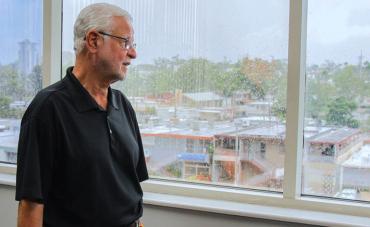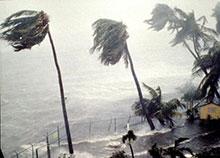
The criticism of Florida's donation of 25 used Dodge Charger police cars to Puerto Rico, as presented in a Thursday Times/Herald story, is all political snark. Which is a great shame.
Do these newspapers really believe cops in Puerto Rico care why Gov. Scott donated the cars? Compassion, votes, it makes no difference to them.
Writes the Times/Herald, "Scott's office said Puerto Rico asked for surplus cruisers. The Times/Herald has asked the governor for documentation of that request." Apparently, the newspapers doubt it.
I can tell you from experience in Mississippi after Katrina: Puerto Rico police are falling down on their knees thanking God for Florida, and frankly, so should anybody else who cares about island's welfare.
 Reporters are missing the larger story here. Puerto Rico right now is all about a cattle pen of system failures -- but one of the most important is its broken and bleeding law enforcement structure. It has left the police demoralized and citizens' sense of security rattled.
Reporters are missing the larger story here. Puerto Rico right now is all about a cattle pen of system failures -- but one of the most important is its broken and bleeding law enforcement structure. It has left the police demoralized and citizens' sense of security rattled.
More important, the island is facing one of the biggest spikes in violent crime in more than a decade, amid a widespread power outage, severe unemployment and an increase in police absences.
During the first four months of 2018 in Puerto Rico, as of April 29, police worked 227 murders, 14 more compared to the same period a year ago. Many were drug-related.
The problem is exacerbated by police leaving the force.
A project from the Special Center for Investigative Journalism, part of a collaboration with students of the Arthur L. Carter Journalism Institute of New York University, tells the story. It deserves wider distribution.
"In just five years Puerto Rico lost nearly a quarter of its police force. Out of those 17,000 officers, more than 4,000 have left their jobs," the story reports. "Many officers who have stayed on the force are unhappy with what they say are low salaries and meager benefits."
San Juan police officer Edward Antanacio explains it from a personal point of view: "You spend time working, you risk your life a couple of times every day and the government doesn't even say thank you for your service. I have nearly 20 years of service and I'm very depressed, very frustrated. My partners are very upset like me."
Morale in all police departments across the island is "in a very dark place." Hurricane Maria's destruction didn't create it, but the deprivations it wrought certainly made job satisfaction sizably worse.
Already bankrupt, the island's overwhelmed government has fallen behind with millions of dollars in overtime payments owed to police officers, who have begun calling in sick in big numbers to protest. The sickout has taken about 2,000 police officers off the street each day in a territory that has 13,600 officers. It forced more than a dozen police stations to close for several hours to a couple of days over last Christmas and New Year's because of a lack of officers. Arrests in the 227 murders this year are virtually nonexistent.
“Because Puerto Rico is broke, for the last three or four years there hasn’t been any recruitment [within the police],” said Hector Pesquera, secretary of the Department of Public Safety. “The Fiscal Oversight Board will not approve any recruitment."
According to Miguel Rodríguez, vice president of the Hispanic Officers Law Enforcement Association and a former police officer in Puerto Rico, the hurricane “was the drop that really filled the cup up.” Many social problems worsened after the hurricane, he said, their origins lying in the political and economic problems of Puerto Rico’s policies.

“We must not lose perspective of the context in which this situation occurs: its connection with the fiscal crisis and the austerity measures imposed by the government and the Fiscal Control Board. It also has to do with nonexistent or ineffective [hurricane] government recovery policies.”
For months after Hurricane Maria, an average shift for a police officer ranged from 12 to 16 hours. Many of them were victims of the big storm themselves. Some lost their homes, forced to live in shelters with their families while still reporting to work. Many also lost their uniforms and their vehicles.
In fact, of Puerto Rico's 4,000-plus standard police vehicles, nearly half went missing or were damaged beyond repair in Hurricane Maria.
Yet, the Times/Herald seems to be blowing off Florida's donation. Why? Because the governor is bragging about it, or because the 25 vehicles are high-mileage and surplus? I can't tell. "As for those police cars, they are all Florida Highway Patrol cruisers between the years 2006 and 2012, FHP said, and have mileage between 82,186 and 213,638. The cruisers were taken off the road in December 2017 and January 2018, under rules that allow cars to be taken off the road after reaching 80,000 miles," the Times/Herald writes.
Old and half clapped-out, it doesn't matter. If these cars from Florida are still serviceable, they're going to be some kind of godsend.
Trust me, I know.
I was in Pascagoula, Miss. after Hurricane Katrina when then-Jackson County Sheriff Mike Byrd took delivery of eight surplus police cars donated from Sheriff Bob Crowder and the good people of Martin County, Florida.
Sheriff Byrd had tears in his eyes. Deputies with little more than the clothes on their backs, still in the post-hurricane recovery period, lined up to claim a car so they could do their job.
Pascagoula, Jackson's county seat and home of the sheriff's fleet of cruisers, was 90 percent flooded by Katrina's storm surge -- at 27 feet high with a six-mile inland reach. It’s considered the most extensive, as well as the highest, surge in the documented history of the United States.
The story isn't why Gov. Scott retired old Florida Highway Patrol cars so he could send them to Puerto Rico or why his senatorial campaign produced an ad celebrating it. The story is the job those cars can do on a still-desperate island.
Reach Nancy Smith at nsmith@sunshinestatenews.com or at 228-282-2423. Twitter: @NancyLBSmith
READ MORE FROM SUNSHINE STATE NEWS
Sunshine Summit to Offer Insight into Puerto Rico's Challenges
Cell Phone Data Measures Impact of Puerto Rico’s Hurricane Exodus on Florida


